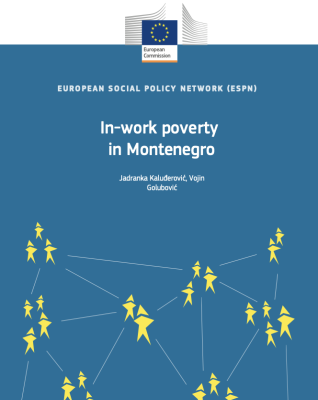Loading

 Description
DescriptionAuthors: Jadranka Kaluđerović and Vojin Golubović (Institute for Strategic Studies and Prognoses)
Although the data from the EU Statistics on Income and Living Conditions (EU-SILC) survey are available for Montenegro (since December 2018), the total in-work poverty1 (IWP) rate is not – only the IWP rate by activity status. Thus, according to the available data, the IWP rate for employees in Montenegro in 2017 was 5.9%, which is 1.5 percentage points (p.p.) lower than the EU-28 average. The same holds for the in-work poverty rate for self-employed persons: 19.8% in Montenegro, compared to 22.7% in the EU-28. This was also significantly below the population average, which was at 23.6%. Despite that, there has been an increase in the poverty rate indicators for the employed since 2013. This is especially evident for the self-employed population, for which the risk-of-poverty rate increased by 8.9 p.p. from 2013 to 2017. Among employees, those working within the public sector are more exposed to the risk of poverty.
Among household characteristics, the work intensity of the household and the number of dependants in the household both significantly affect the incidence of poverty. Thus, the highest risk is observed in households with very low work intensity and in households with two adults and three or more children. Regarding individual characteristics, the incidence of poverty is higher for young people and those with lower education.
As employment significantly reduces the risk of poverty in Montenegro, the majority of the policy measures focus on activation and social support for those who are very hard to employ. The most important measure that targets IWP is the minimum wage, which is 40% of the average wage and amounts to €193 (€288 gross) per month. The minimum wage in Montenegro is protected on two levels: by a system of coefficients defined in the general collective agreement and by the level of the minimum wage, defined by the labour law.
Aside from the minimum wage, some policies that directly influence IWP in Montenegr include: progressive taxation, family benefits, active labour market measures and measures that tackle labour market segmentation. Among the indirect policies are childcare, long-term care and healthcare, life-long learning and housing.
Read more: ESPN Thematic Report on In-work poverty - Montenegro (2019)
Publication can be downloaded by clicking on this link.